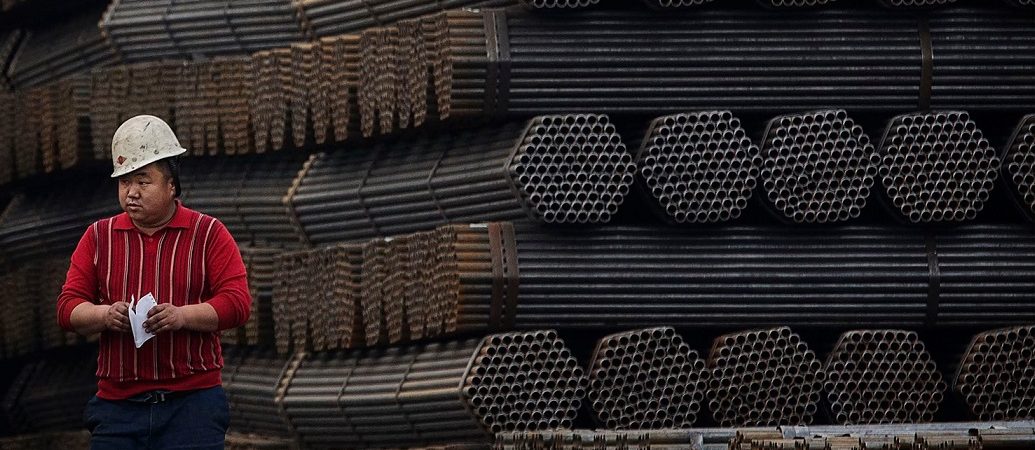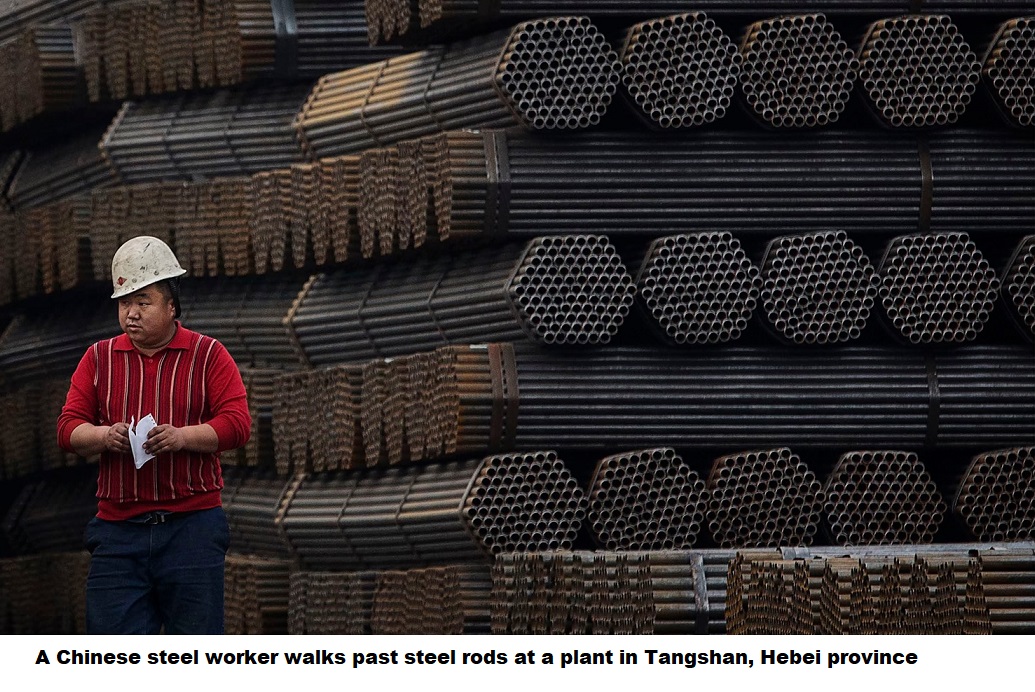
US, EU Tango Against ‘Dirty’ Chinese Steel
 The United States and European Union have ended a major tripping point in their relations with a new global pact to combat over capacity in steel and aluminium sectors, and to manage the contentious tariffs issue. The White House asserted that the deal is to restrict access to market for ‘countries like China’ that dump ‘dirty steel’ and thus contribute to global over supply. Further, the US also indicated that it was working with countries like UK and Japan, for collective action, to ‘address the root causes of market distortions and climate impact of state subsidies and over-capacity.’
The United States and European Union have ended a major tripping point in their relations with a new global pact to combat over capacity in steel and aluminium sectors, and to manage the contentious tariffs issue. The White House asserted that the deal is to restrict access to market for ‘countries like China’ that dump ‘dirty steel’ and thus contribute to global over supply. Further, the US also indicated that it was working with countries like UK and Japan, for collective action, to ‘address the root causes of market distortions and climate impact of state subsidies and over-capacity.’
If the announcement by the US had not been a clear enough indication, experts suggest that the move itself was a major step to curtail China. The Bamboo Capitalist has been the world’s largest producer of steel and aluminium by a large margin, and has been accused of selling them in global markets at cheap rates by utilizing subsidies to keep their costs artificially lower. More importantly, China is also responsible for 27 per cent of global carbon emissions, and 15 percent of the country’s total emissions come from steel industry alone. Put simply, the deflation in prices artificially is induced; the environmental cost of the Chinese steel is also steep.
The ball does not stop rolling at steel and aluminium industry, however. China has in recent years come under fire for blatant disregard of the global trade norms. Though China became a member of the WTO in 2001 it has been persisting with its opaque policies in face of an open-market oriented international trading system.
Most countries accuse that China has opted to exploit the system instead while strengthening its trade distortionary policies. The use of ‘developing country’ status to claim ‘special and differential treatment’ on trade issues has also become an issue, since Chinese prominence in world trade would suggest that the country is probably not what the WTO provision targeted.
In fact, China situating itself within the global trading system has come with a new set of complications. In 2020, a WTO trade policy review of China has led to scathing criticism from all over the world for ‘bullying’ policies undertaken by the northeast Asian nation.
A European Council of Foreign Relations policy brief mentions how China is willing to use economy as a way to ‘punish’ EU into changing its policies. Similar fears have been echoed in Australia and Canada as well, wherein China has utilized tariff barriers in retaliation of the COVID-19 critique and the Huawei issue respectively.
Despite the economic landmine for most nations who share bilateral trade relations with China, the dissatisfaction against predatory policies has led to many state actors taking to critiquing its trade practices. South Korea, a relatively ambivalent neighbour, has started to complain about abuse of trademark practices, while diversifying its trade portfolio after the THAAD debacle.
India has, similarly, argued regarding restriction of access into Chinese agricultural markets. The critique is not just purely economic in nature; true to the neo-liberal economic system that has been established, concerns of social order have also become a major point of debate on Chinese dissidence to the international norms. UK has raised concerns regarding the Uyghurs in China, while multiple nations are questioning Chinese violation of the basic human rights in Xinjiang and Hong Kong.
Thus, the new metals alliance has become one in the emerging line of counter-measures against what have been described as distortionary trade practices by China. By taking steps such as ‘melt and pour’ mechanism to ensure steel is clearly labelled throughout the production, the pact intends to keep out any Chinese steel that may be ‘trans-shipped’ or get utilized in any of the European products that are imported by the US, thereby getting into the markets ‘through backdoor’.
While this will certainly not end the problem, the hint of promise that other countries may join in the pact might imply that China may have out of reach major markets for its steel or aluminium products. This, may be a key step in either downsizing the Chinese economic influence, or at least forcing the country to revisit its opaque, ‘bullying’ trade policies.
-
CHINA DIGEST
-
 ChinaChina Digest
China’s PMI falls for 3rd month highlighting challenges world’s second biggest economy faces
ChinaChina Digest
China’s PMI falls for 3rd month highlighting challenges world’s second biggest economy faces
-
 ChinaChina Digest
Xi urges Chinese envoys to create ‘diplomatic iron army’
ChinaChina Digest
Xi urges Chinese envoys to create ‘diplomatic iron army’
-
 ChinaChina Digest
What China’s new defense minister tells us about Xi’s military purge
ChinaChina Digest
What China’s new defense minister tells us about Xi’s military purge
-
 ChinaChina Digest
China removes nine PLA generals from top legislature in sign of wider purge
ChinaChina Digest
China removes nine PLA generals from top legislature in sign of wider purge
-
-
SOUTH ASIAN DIGEST
-
 South Asian Digest
Kataragama Kapuwa’s arrest sparks debate of divine offerings in Sri Lanka
South Asian Digest
Kataragama Kapuwa’s arrest sparks debate of divine offerings in Sri Lanka
-
 South Asian Digest
Nepal: Prime Minister Dahal reassures chief ministers on police adjustment, civil service law
South Asian Digest
Nepal: Prime Minister Dahal reassures chief ministers on police adjustment, civil service law
-
 South Asian Digest
Akhund’s visit to Islamabad may ease tensions on TTP issue
South Asian Digest
Akhund’s visit to Islamabad may ease tensions on TTP issue
-
 South Asian Digest
Pakistan: PTI top tier jolted by rejections ahead of polls
South Asian Digest
Pakistan: PTI top tier jolted by rejections ahead of polls
-






Comments